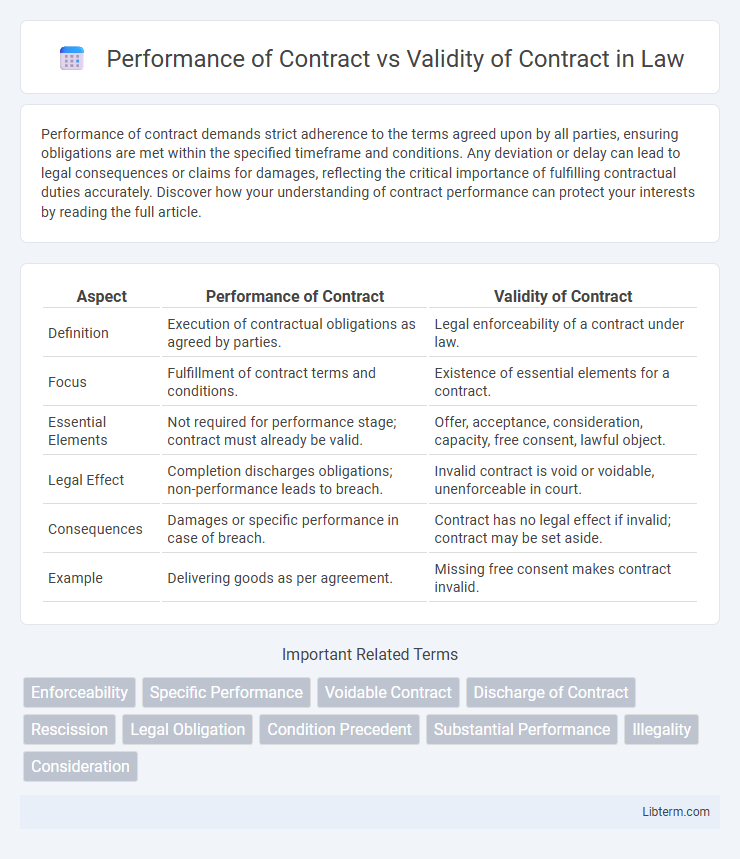Performance of contract demands strict adherence to the terms agreed upon by all parties, ensuring obligations are met within the specified timeframe and conditions. Any deviation or delay can lead to legal consequences or claims for damages, reflecting the critical importance of fulfilling contractual duties accurately. Discover how your understanding of contract performance can protect your interests by reading the full article.
Table of Comparison
| Aspect | Performance of Contract | Validity of Contract |
|---|---|---|
| Definition | Execution of contractual obligations as agreed by parties. | Legal enforceability of a contract under law. |
| Focus | Fulfillment of contract terms and conditions. | Existence of essential elements for a contract. |
| Essential Elements | Not required for performance stage; contract must already be valid. | Offer, acceptance, consideration, capacity, free consent, lawful object. |
| Legal Effect | Completion discharges obligations; non-performance leads to breach. | Invalid contract is void or voidable, unenforceable in court. |
| Consequences | Damages or specific performance in case of breach. | Contract has no legal effect if invalid; contract may be set aside. |
| Example | Delivering goods as per agreement. | Missing free consent makes contract invalid. |
Understanding Contractual Performance
Performance of a contract refers to the fulfillment of obligations as specified within the contractual terms, making it a critical aspect of executing agreements. Validity of a contract, however, concerns whether the contract meets all legal requirements such as offer, acceptance, consideration, and lawful purpose to be enforceable. Understanding contractual performance involves recognizing the duties each party must complete to avoid breach and ensure the contract's intended outcomes are achieved.
Defining Contract Validity in Law
Contract validity in law refers to the enforceability of an agreement, ensuring it meets essential elements like offer, acceptance, consideration, mutual consent, and lawful purpose. Performance of a contract pertains to the fulfillment of contractual obligations as stipulated, impacting the execution rather than the initial legitimacy of the contract. Valid contracts create binding obligations, whereas performance addresses the parties' adherence to those obligations.
Key Elements of a Valid Contract
Performance of contract hinges on the fulfillment of obligations by the parties involved, while validity of contract depends on essential elements such as offer, acceptance, consideration, mutual consent, legal capacity, and lawful object. A contract must have these key elements clearly established to ensure enforceability and legal recognition. Without validity, any performance attempt lacks binding effect, rendering the contract void or voidable.
Legal Consequences of Invalid Contracts
Performance of contract is contingent upon the contract's validity, as only a valid contract imposes enforceable obligations on the parties involved. Legal consequences of invalid contracts include non-enforceability, restitution to prevent unjust enrichment, and potential liability for damages arising from reliance or breach. Courts typically void invalid contracts to protect parties from obligations that lack legal foundation, thereby ensuring contractual fairness and certainty.
Performance Obligations under Contract Law
Performance of contract involves fulfilling the specific duties outlined in the agreement, ensuring that each party meets their contractual obligations as defined by law. Validity of contract hinges on essential elements such as offer, acceptance, consideration, and legal purpose, determining whether a contract is legally enforceable. Under contract law, clearly defined performance obligations are critical to both the execution and enforceability of a valid contract.
Remedies for Non-Performance of Contracts
Performance of contract involves the fulfillment of agreed terms by the parties, ensuring legal obligations are met, while validity of contract pertains to the enforceability based on factors like consent, capacity, and lawful purpose. Remedies for non-performance include damages, specific performance, rescission, and injunctions, aimed at compensating losses or enforcing contractual duties. Courts assess the nature and extent of breach to determine appropriate remedies, balancing contractual fairness and legal principles.
Factors Affecting Contract Performance
Factors affecting contract performance include the clarity of contract terms, the parties' capacity and willingness to fulfill obligations, and external conditions such as economic shifts or legal changes. Effective communication and timely resolution of disputes directly influence successful contract execution. Proper documentation and adherence to agreed deadlines also play crucial roles in maintaining contract validity and enforceability.
Distinction between Performance and Validity
Performance of a contract refers to the actual fulfillment of contractual obligations by the parties involved, whereas validity of a contract pertains to the legal enforceability of the agreement from the outset. A contract may be valid but not yet performed, or performance may be disputed despite an otherwise valid contract. The distinction hinges on validity addressing the contract's formation and legal effect, while performance concerns the execution of agreed terms.
Enforceability of Contracts: Performance vs Validity
Enforceability of contracts depends significantly on both performance and validity, where validity ensures the contract meets legal requirements such as mutual consent, consideration, and lawful purpose. Performance refers to fulfilling contractual obligations as agreed, and incomplete or improper performance can lead to disputes over enforceability despite the contract's validity. Courts typically uphold a valid contract's enforceability but may allow remedies or damages when performance is breached or incomplete.
Practical Considerations in Contract Drafting
Performance of contract entails the fulfillment of contractual obligations as stipulated, ensuring both parties meet agreed terms to avoid breaches. Validity of contract hinges on essential elements such as mutual consent, lawful purpose, and consideration, which confirm the contract's enforceability in legal settings. Practical considerations in contract drafting involve clear articulation of performance standards, timelines, and contingency clauses to mitigate disputes and uphold the contract's validity under jurisdictional requirements.
Performance of Contract Infographic

 libterm.com
libterm.com